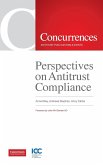A remarkable reversal in popular satisfaction with antitrust law has occurred: Germany--once the classic land of cartels--now enforces an antitrust law vigorously and subject to little meaningful opposition, while the United States--itself the home of antitrust law--enforces its antitrust law erratically and against significant criticism. Whatever may be the precise measure of support in each country for antitrust laws, even the most cursory observation discloses a criticism of antitrust law in the United States not matched in kind or degree in the Federal Republic of Germany. This work investigates aspects of some of the many possible explanations--legal, social, and economic--for this remarkable turnaround. It considers perhaps the most obvious question: How do the two antitrust laws differ? In partial answer, it suggests that certain principal criticisms of American antitrust law reflect dissatisfaction as much with the legal methods by which that law is applied as with the law itself. German cartel law, Maxeiner suggests, utilizes different legal methods which avoid or mitigate many of the problems encountered in American antitrust law.
Hinweis: Dieser Artikel kann nur an eine deutsche Lieferadresse ausgeliefert werden.
Hinweis: Dieser Artikel kann nur an eine deutsche Lieferadresse ausgeliefert werden.








